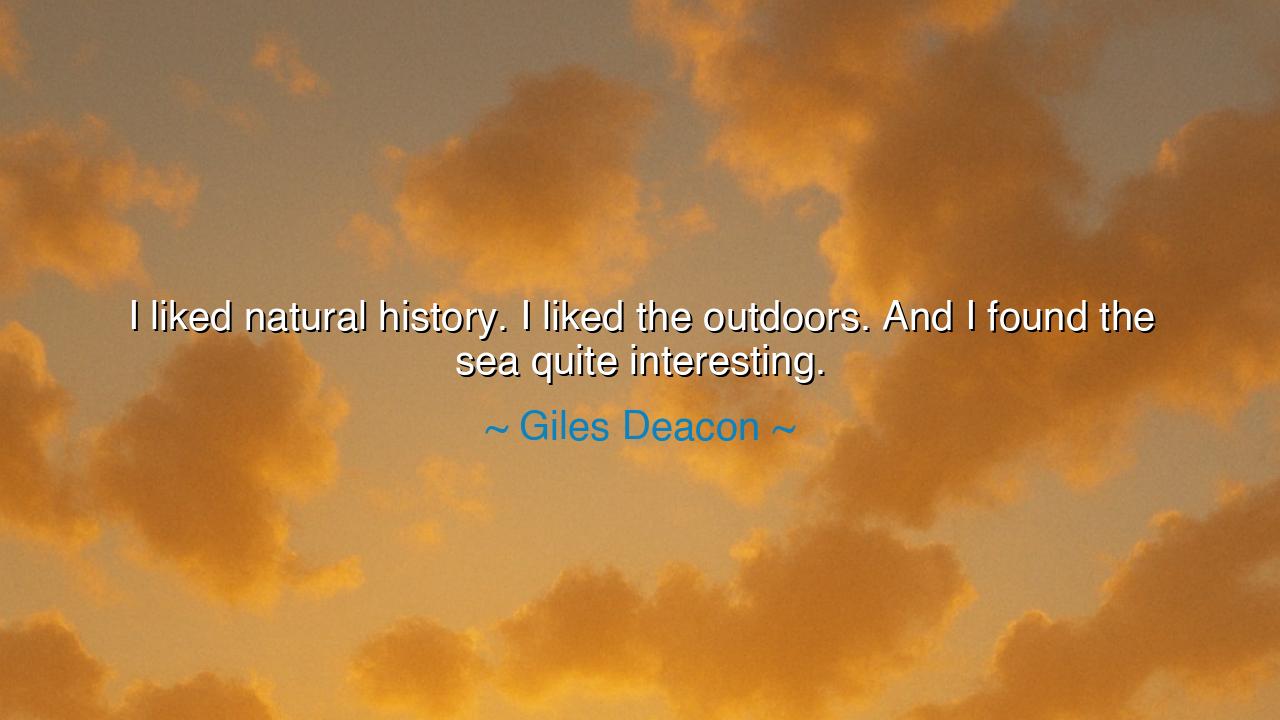
I liked natural history. I liked the outdoors. And I found the






“I liked natural history. I liked the outdoors. And I found the sea quite interesting.” Thus spoke Giles Deacon, the English fashion designer known for his bold imagination and for weaving humor and grandeur into fabric. At first glance, these words seem light—almost casual. Yet beneath their simplicity lies an ancient current of wisdom: that creativity begins not in the studio, but in the world itself. Deacon’s reflection reveals the sacred bond between observation and creation, between the natural and the artistic. For in the vastness of nature—the rhythm of tides, the patterns of shells, the geometry of flowers—he found the primal forms from which all art is born.
The ancients understood this truth well. Before the painter took up his brush, before the sculptor struck marble, the first artist was the observer of nature. The Greek philosopher Aristotle once said that art imitates life, not in its surface, but in its essence. To study natural history, as Deacon did, is to learn the language of that essence—to see the design of the world in the flight of birds, the symmetry of leaves, and the mysteries of the deep sea. Such study is not mere curiosity; it is a form of reverence. It teaches that the artist is not a creator from nothing, but a translator of what already exists, hidden in the folds of the earth and the motion of the waves.
In Deacon’s confession lies the journey of every artist who learns to look before they make. To say “I found the sea quite interesting” is to admit awe—to be humbled by the infinite textures of creation. The sea has always been the teacher of form and motion. The sculptors of ancient Greece drew inspiration from its flowing grace; the sailors and poets of every age found in its depths both terror and transcendence. From Hokusai’s great waves to Turner’s storm-swept skies, the sea has whispered to humanity that beauty is not perfection—it is power, unpredictability, and life itself. Deacon’s fascination with it is a continuation of that timeless dialogue between the human spirit and the natural world.
The designer, like the philosopher or the poet, learns from what the earth reveals. When Deacon speaks of his love for the outdoors, he reminds us that creativity dies in confinement. True design, he implies, is not born under artificial light, but under the open sky. It grows from walking in forests, studying insects, or feeling the changing wind. The ancient Chinese masters of painting would retreat to mountains for months, returning not with sketches of landscapes, but with the spirit of nature itself captured in brushstrokes. So too does Deacon, by loving the outdoors, affirm that to create something lasting, one must first learn to listen to the quiet designs of the world around them.
This idea—of creation born through observation—has appeared across ages. Think of Leonardo da Vinci, who dissected flowers and animals not from morbid curiosity, but from divine wonder. He saw the same curves in the motion of water as in the curls of a woman’s hair, the same balance in a seashell as in the architecture of a cathedral. His notebooks overflow with studies of nature because he knew that to design well is to imitate the Creator—not in name, but in method. Deacon’s interest in natural history is a modern echo of this same truth: that every artist must be both scientist and dreamer, student and worshipper of the world’s intricate order.
Yet, there is also humility in his words. He does not claim mastery or revelation—only curiosity. “I liked,” he says, not “I knew.” It is in that humility that his wisdom lies. For creation does not come from control, but from wonder. Those who believe they already understand nature cannot learn from it. But those who stand






AAdministratorAdministrator
Welcome, honored guests. Please leave a comment, we will respond soon